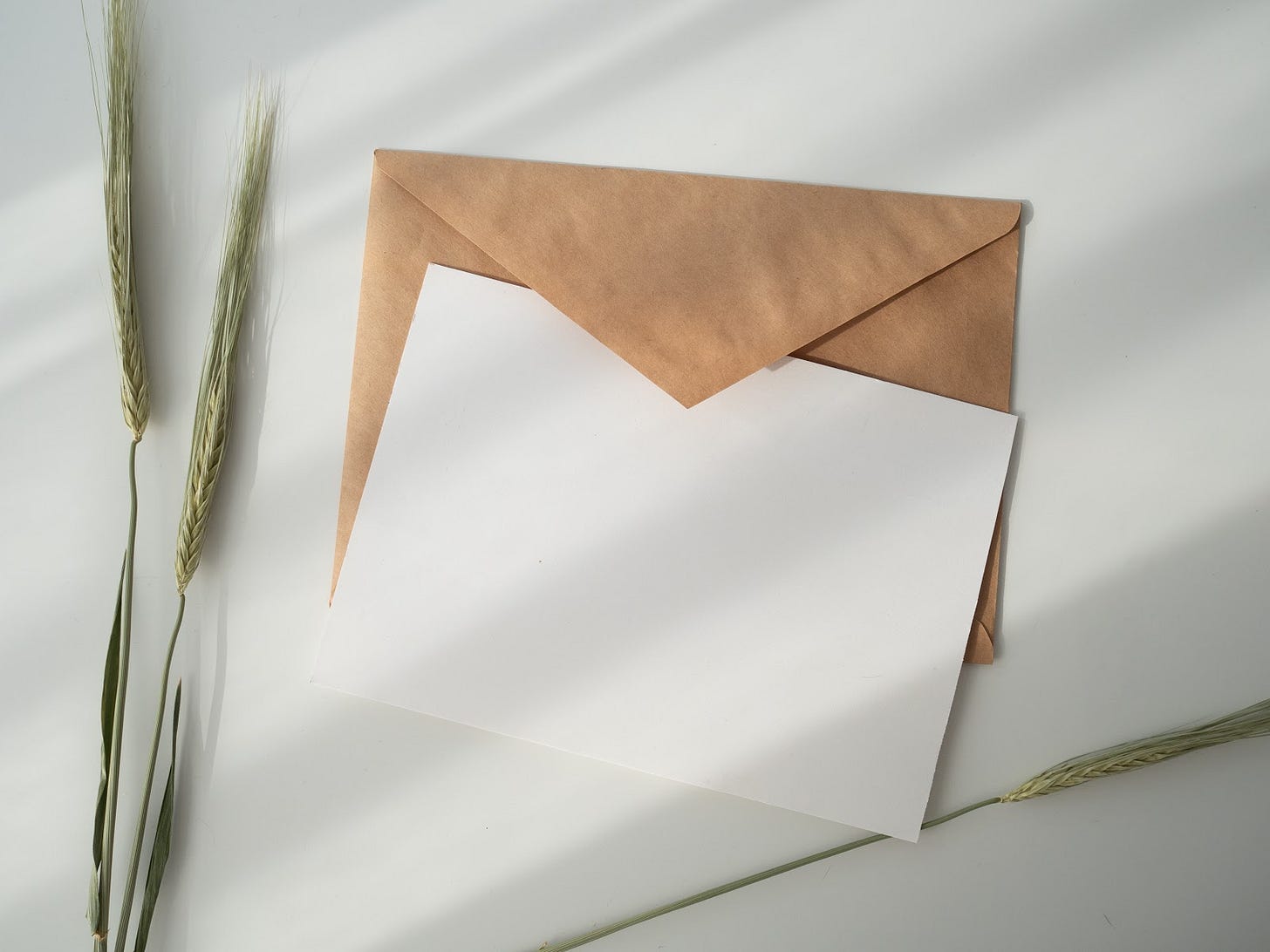Wisdom is ours to find
I’m not sure I’d read my writing, either.
One of my favorite things about writing this newsletter is hearing from the people who read it. And every so often, I get a message that makes me stop in my tracks.
Two weeks ago, I received an email from a reader named John. “Hello Katie,” he began. “You don’t know me. We’ve never corresponded.” He went on to explain that he subscribed to My Sweet Dumb Brain a few years ago after reading an article I’d written.
I greatly appreciated—and chuckled at—his honesty from there: “I was subscribed for a while, but as I was starting a new job and didn’t really read a lot of the posts, I never bothered to join the paid subscription plan,” he wrote. “A few weeks later, I unsubscribed all together.” Fair enough!
John was writing to me now, though, because he’s at a very different spot in life. Last month, his 45-year-old wife died “suddenly and tragically” after complications from surgery.
“Something in my broken brain remembered today that I'd actually subscribed to your newsletter for a while, so in digging through my inbox, I found some of the emails I received while I was subscribed,” he shared.
John ended his message with a heartfelt thank you that made me tear up. He admitted that he’s not yet in a state of mind to read all of the newsletter issues he missed, but in time, he will.
When you’re deep in grief, there’s a tendency to want to warn other people of the sorrow they will one day face, to protect them from the mistakes you made. We’ve all seen it, whether it’s a grief-stricken person on the news or a friend on social media. Hug your loved ones, they say. You never know when it’s the last time you’ll see them. So we do. We give our families and friends a little extra love, grateful that we’re not in that sad person’s shoes.
Before long, though, we return back to our old, comfortable routines. The family game nights slowly get phased out for individual screen time. The extra-long hugs are replaced by semi-annoyed bickering. The gratitude journal becomes a place to log complaints. It’s not that we forget how fragile life is; it’s that we can’t bear to think about it all the time.
After my husband died, I remember wishing that I had better prepared myself for the devastation I would experience. I knew that, one day, Jamie was going to die. So why didn’t I have a plan in place for how to navigate life alone? I scrambled to figure out his various passwords and remember where he stashed important information, mad at myself for not knowing those things by heart. I lamented the paltry life insurance plan we were on, and worried about figuring out finances alone. I regretted that Jamie and I hadn’t written each other a series of long letters, only to be read after one of us passed away.
Most of all, I bemoaned that I wasn’t more emotionally prepared. If grief is a given in life, why hadn’t I steeled myself for it?
I now realize that no amount of preparation would have lessened the pain I felt. Yes, we could have done a better job of making sure we knew how to do certain tasks that the other person usually handled, but there’s no logistical loophole that bypasses heartache.
I couldn’t have prepared myself for Jamie’s death because I hadn’t yet lived it. There’s no shortcut to obtaining the lessons of grief—we must experience it firsthand. As Proust wrote: "We do not receive wisdom, we must discover it for ourselves, after a journey through the wilderness which no one else can make for us, which no one can spare us, for our wisdom is the point of view from which we come at last to regard the world.”
I can relate to pre-widowed John. I’m not sure if I’d read my writing, either.
It wasn’t until my grandmother died, when I was 21, that I picked up my first grief book, Joan Didion’s The Year of Magical Thinking. I didn’t consider the value of a grief community until I was 28, after my dad passed away. And it wasn’t until I was 31, when my husband died, that I truly dove into learning, reading, and writing about grief. I started listening to Terrible, Thanks for Asking, and became an active member of the Hot Young Widows Club. I read more grief books than I could count. I forged some incredible friendships with people who experienced losses similar to mine.
As it turns out, there was a whole world of grief support out there. It was ready for me only when I was ready for it.
Losing Jamie has altered how I live my life. There are lots of positive changes, like prioritizing happiness over success, and not holding back in telling people that I love them. There are grim impacts, too, like when sweet moments shared with Billy and our daughter are interrupted by intrusive thoughts of sudden death.
There’s no putting the genie back in the bottle: I now know how thin the veil is between life and death, and how deep sorrow can be. With that knowledge, I could have chosen not to love anyone else—to keep my circles small and my heart protected. Or I could have taken the path that I did: To love unapologetically, to welcome both the terrible pain and incredible joy that life holds.
Right now, John is wading through the wreckage of his wife’s death. At some point in the future, after plenty of sorrow, he’ll find himself at a similar crossroads.
It can be annoyingly difficult to stay in the moment—not dreading the future, or lamenting the past. Instead of holding on tight to the life I’ve created with Billy, I must let it unfold on its own. Our daughter will grow up, faster than we probably want. We will experience hard times. There will be moments of extreme heartache and pain. We will all inch closer to death.
But there will be—and are—many light moments, too. As I’m writing this, I can hear Billy singing goofy songs to our baby, who’s responding with excited babbles and spit bubbles. Their sweet sounds are filling my heart and soul in the most nourishing way.
I’m acutely aware that this moment won’t last forever. It never does. But that’s one of the gifts of hard-earned wisdom: You learn to appreciate the good times while they’re here.
xoxo
KHG
p.s. This might be a self-indulgent question, but bear with me: Why do you read My Sweet Dumb Brain? Did your own loss bring you here? What have you gained from reading these essays? I’m genuinely curious! Reply to this email, leave a comment, or send me a message. I’ll feature a variety of responses in Friday’s newsletter, which is for paying subscribers.
Sharing is caring
Thank you, Tanmoy!


I’m on a quest to reach 5,000 newsletter readers and 500 paying subscribers this year. Is this too ambitious? Time will tell! As of this week, I’m at 4,164 readers and 354 paying subscribers.
You can help me reach this goal by recommending My Sweet Dumb Brain to a friend or two, purchasing a subscription for yourself or someone else, or sharing this issue on social media. Word of mouth goes a long way in the newsletter world!
As always, thank you for reading this newsletter. It means so much to me.
My Sweet Dumb Brain is written by Katie Hawkins-Gaar. It’s edited by Rebecca Coates, who sends her condolences to John. It sounds like Rhonda was a wonderful person who, no doubt, will be missed by many. Photos by Kate Macate on Unsplash.





I read your newsletter because a lifetime ago we were best friends. I miss that relationship, and even though we haven't seen each other in almost a decade, I care.
Wow. You mentioned you might consider my story for an upcoming essay. I still haven't been able to read your posts, but as much as I can, I am looking forward to it. We now share a sad bond, and I'm thankful I can learn part of this wicked path through your experiences.